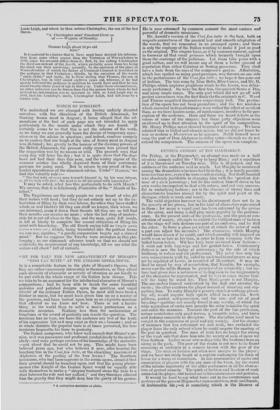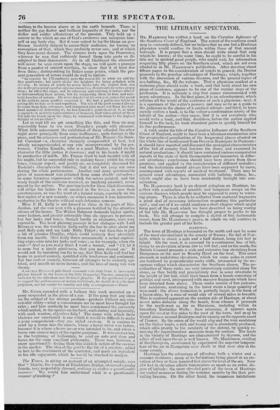GENTEEL COMEDY AT THE HAYMARKET.
ON Friday, at the Haymarket, an attempt was made on a half obsolete comedy called the Way to keep Him ;' and a repetition of it is threatened on Tuesday next. This is ill-judged, and the coldness of the audience said as much. Let Murphy be numbered among the dramatists who have had their day ; it is hardly possible to revive him now, even if he were worth reviving. Not thatChurchill was absolutely justifiable in charging him with the prudent dul- ness' of a civic personage ; but he has written himself down in his own works incompetent to deal with nature, and not very success- ful in embodying- fashion ; nor is the absence of strong lines and characteristic touches atoned for by the spirit and point of the dialogue, which is weak and wordy. The valid objection however to his disinterment does not lie in the poverty of his pieces, but in the kind of characters represented in them ; for many a vapid part has been informed by the genius of the actor, and many a dull play made popular by the perform- ance. In the present state of the profession, and the present con- stitution of society, attempts to exhibit the brilliant man of fashion on the stage will only distress one part of an audience, and be dull the other. Is there a glass yet extant at which the actor of such a part can adjust his manners ? The character, which Murphy would have drawn if he could, and which possibly still lingered on earth even so late as his time, is gone to keep company with the belted baron below. Wit has long been divorced from fashion— it went out with bag-wigs and low pocket-holes. Gentlemanly dulness is now the badge of aristocracy ; by the side of which brilliancy is vulgar and wit professional. The actor has only his own conception to walk by, aided by such traditional graces as may yet be reported of Lewis, or recorded of Mountfort. It may in- deed be urged by way of consolation, that Kemble, for example, never saw the noble Roman he personated so admirably ; but na- ture had given him a nobleness of feeling akin to the magnanimity of the character he represented, and he was in some degree him- self the thing he stood for. Then Shakspeare is not Murphy. The one makes himself understood by the dull and elevates the rustic ; the other cumbers the player instead of directing and sup- porting him. To carry Murphy's poverty-stricken verbiage plausi- bly off, would require high spirits added to a graceful, frank address, perfect self-possession, and the tone and air of good breeding—qualities not usually found in any society, of which the wide separation of ranks now permits the actor to imbibe the spirit and catch the manners. Towards the part of the tine gentleman, nature contributes only good nerves, a tuneable voice, and limbs and features amenable to discipline. The discipline itself must be sought in the commerce of good and gay society. But the change of manners that has estranged wit and rank, has excluded the player from the only school where he could acquire the mastery of the part in question. The man of rank has no longer the strong or the weak side that drew him into the society of men of more wit than fashion. Ladies never now-a-days take the buskined hero an airing in the park. The peer of the realm is not now to be found carousing at midnight in a remote tavern with the peer of the stage. The man of fashion not often now merges in the player; and we have not lately heard of a captain exchanging his troop of horse for a troop of comedians. In this commixture of ranks and association of players with the gay men of the town, lay the secret of the infinite superiority of the older performers in all the charac- ters of genteel comedy. The spirit of fashion and freedom of rank animated the player, and looked out in his countenance and gestures. • It would be hard to say what looks out in the countenance and gestures of the present Haymarket representatives, male and female, of fashionable life ;--it is something which is the likeness of nothing in the heaven above or in the earth beneath. There is neither the gay flutter and brilliant loquacity of the past, nor the duller and colder affectations of the present. They hold up a mirror in the which no one of God's creatures can recognize him- self or any body else. But it were unjust to lay the blame on gen- tlemen laudably diligent to amuse their audience, for having no conception of that, which they probably never saw, and of which they have never dreamt. The censure rests upon the Procrustes, whoever he was that ruthlessly forced them into parts so ill- adapted to their dimension's. As in all likelihood the character will never be seen again upon the stage, we will quote a passage from a painter of ancient worthies, to show that it at least has been there ; distinguishing by Italics some points, which the pre-
sent generation of actors would do well to imitate.
"In comedy he [Mountfort] gave the truest life to what we call the fine gentleman ; his spirit shone the brighter for being polished with aecency. In scenes of gaiety he never broke into the regard that was tble to the presenceof equal or superior characters, though inferior actors plc yep them ; he filled the stage, not by elbowing and crossing it before others' or disconcerting their action, but by surpassing them in true and mas- terly touches of nature. He maws- laughed at his own jest, unless the point of his raillery upon another required it. He had a particular talent in giving life to bons mots and repartees. The wit of the poet seemed always to come from him extempore, and sharpened into snore wit from his bril- liant manner of delivering it; he had himself a good share of it, or what is equal to it, so lively a pleasantness of humour, that when either of these fell into his hands upon the stage, he wantoned with them to the highest delight of his auditors."
Let us wait till we get something like this, and then we may reasonably hope to see even Murphy's people with pleasure. What little amusement the exhibition of them afforded the other night arose principally from some buffoonery, quite foreign to the piece, and the grimaces and gesticulation of Mr. Farren's Sir Bash- ful Constant—a character strangely compounded at best, but utterly misapprehended, at any rate misrepresented by the per- former. Charles Kemble, who is a good Marlow, would do the character the little justice it deserves ; and in his hands it might be productive of mirth. Mr. Farren tried to look bashful with all his might, but he succeeded only in making faces ; whilst his sharp tones, vinegar aspect, and jaunty air, so completely disguised Sir Bashful's characteristic timidity, that it did not peep out once during the whole performance. Another and more questionable piece of amusement was obtained from some double entendres; or some harmless expressions which the actors pointed, and the ready laugh of the audience received, as implying mischief, never meant by the author. The growing taste for these illicit diversions, will oblige the ladies to sit masked in the boxes, to save their countenances, as was the wont of a former reign, especially on the first nights of a new comedy, on which occasions it was hazardous venturing to the theatre without such defensive armour.
Miss F. H. Kelly is not formed to shine in the parts of Mrs. Jordan, yet she was seen with a pleasure testified by the attentive silence of the house. The Widow Belmour demands higher spirits, more fashion, and greatef intrepidity than she appears to possess ; but her looks and tones, though hardly in character, were very agreeable. The least pleasing passage in her dialogue with Lord Etherege was the would-be lively rattle she has to utter about my aunt Roly-poly and my Lady Betty Fidget ; but then this is just a bit of genuine Murphy, which could scarcely flow pleasingly from any mouth. Miss Kelly threw occasionally a rather captiva- ting expression into her looks and voice ; as for example, when she said—" And so you really think I want a tenant," and "I'll let it to none but a single gentleman, that you may depend on." It would not be venturing too far to say, that Miss Kelly will find her home in genteel comedy, sprinkled with tenderness and sentiment. Let her eschew tragedy, forswear all attempts to be violently agi- tated, and mouth no more heroics, and the love of many will wax strong.
A GENTLE HiNT.—A pale-faced coxcomb Nviat dirty linen is incessantly placing himself in the boxes at the little Haymarket Theatre, annoying. the audience by his ridiculous and ill-timed plaudits. If this gentleman is paid to support the performances of certain individuals, he should do it with more judgment, and not render his venality and folly so conspicuous.---Times.



















 Previous page
Previous page